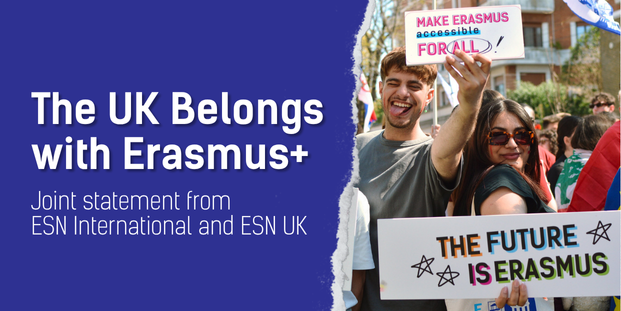
The Erasmus Student Network International and Erasmus Student Network UK, as part of the Embrace Erasmus+ campaign and working alongside the EU Delegation to the UK, have been consistently advocating for the UK’s reassociation to Erasmus+ over the last two years. As a result of the recent EU-UK summit, a commitment to rejoining Erasmus+ and creating a Youth Mobility Scheme between the UK and the EU represents a significant, positive step for young people in the UK.
The Erasmus+ programme is a stepping stone for young people to broaden their horizons and develop their personal, professional, and educational competencies. Each year, the programme enables 300,000 young people to engage in life-changing exchange, with XV ESNsurvey reporting that 75% of respondents felt improvements to their communication skills and open-mindedness after engaging in an Erasmus+ mobility.
ESN International and ESN UK passionately support a re-introduction which will prove life-changing for future participants in the UK, as it has done for millions of Europeans since its creation in 1987. In the years since the UK left Erasmus+, fewer UK higher education students are going on mobility - from 26,210 students in 2017-18 to just 10,960 in 2021-22, as reported by Universities UK. It is important to note that this case is not just limited to higher education - comparing Erasmus+ mobilities across all sectors in 2020 to the Turing Scheme in 2023, there has been a 20% drop in the number of mobilities taken by British young people.
While the Turing Scheme was created to fill the gap left by Erasmus+, it still requires significant development to reach the same goals and audience as Erasmus+. Lacking funding for youth groups, training and staff, Turing fails to provide young people with opportunities outside of learning mobility. A lack of reciprocity remains a key issue for many UK universities, alongside practical challenges, now unable to engage in connections with colleagues across Europe and accept students from their institutions on mobility. 79% of Higher Education providers found the process of applying for Turing funding difficult, resulting in ‘participants losing confidence’, reported by its 1-year evaluation. The alternative - cooperation projects under Erasmus+ that create lasting change in organisations and local communities, can foster civic engagement and intercultural dialogue among young people.
The views of students and young people were marginalised when the UK left the European Union. Rejoining Erasmus+ represents an essential and important change, empowering them with new opportunities and ensuring their voices are represented and heard.
ESN International and ESN UK remain united in advocating a better future for mobility within the UK, and improved opportunities for UK students. We believe Erasmus+ is a missing piece in the future of young people.

Follow ESN